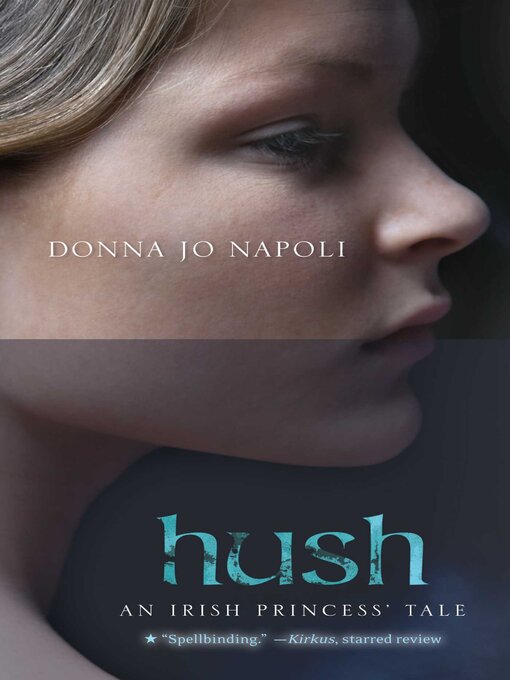Based on an ancient Icelandic saga, award-winning author Donna Jo Napoli has crafted a heartbreaking story of a young girl who must learn to forget all that she knows and carve out a place for herself in a new world — all without speaking a word.
-
Creators
-
Publisher
-
Awards
-
Release date
June 23, 2008 -
Formats
-
Kindle Book
-
OverDrive Read
- ISBN: 9781439107614
-
EPUB ebook
- ISBN: 9781439107614
- File size: 2024 KB
-
-
Languages
- English
-
Levels
- ATOS Level: 3.9
- Lexile® Measure: 570
- Interest Level: 6-12(MG+)
- Text Difficulty: 2-3
-
Reviews
-
Publisher's Weekly
Starred review from October 1, 2007
Close in tone and audience to Napoli's Bound
, this powerful survival story invents a backstory for Melkorka, a character in a major Icelandic work, the Laxdæla saga. Melkorka, 15, and sister Brigid, eight, are daughters of an Irish king early in the 10th century, when Viking raids on castles and monasteries are common. After a Norse youth attacks their brother, their father plans revenge by luring a Viking ship to their town. The girls, dressed as boys in peasant clothing, are hurriedly sent for their safety to a distant “ringfort.” Instead, they are captured by Russian slavers who troll the coastlines, kidnapping women and children. To conceal their high birth, Mel and Brigid do not speak, and their silence gives them a hold over their captors, the leader of whom comes to fear that Mel is an enchantress. Napoli does not shy from detailing practices that will make readers wince: human hairs serve as sutures, bloody wounds are stuffed with moss—and the Russian crew repeatedly gang-rapes an older captive. Melkorka's journey becomes intellectual as well as geographical. Accustomed to being waited on, she admits to disdain for slaves: “Some are of ordinary intelligence, but most are stupid,” she says at the beginning, an opinion that will change radically with her reversed circumstances. The vocabulary, much of which is specific to the setting, may challenge readers, but it's unlikely to stop them: the tension over Mel's hopes for escape paces this story like a thriller. Ages 12-up. -
School Library Journal
Starred review from December 1, 2007
Gr 8 Up-In 10th-century Ireland, coexisting with the Vikings makes life dangerous, even for a princess. When Melkorka's father plans to avenge a brutal Norse attack, she and her sister are dressed as peasant boys and sent away for safety. However, they are captured by slave traders, who sail away with them. Drawing upon strength she did not know she had, Melkorka survives her capture and enslavement by choosing to become mute. At first, the silence comes from the princess's disdain for her animalistic captors. Before long, she realizes that her refusal to speak intrigues one of them and gives her a modicum of power over him that ends up saving her life. The longer she remains silent, the more mysterious Melkorka becomes to the men around her because nothing they do rattles her resolve. Even when she is finally sold to a powerful Norseman and becomes his concubine, her silence remains. And yet, she is not voiceless. The way in which she conducts herself speaks volumes about her will to live and her humanity. Perhaps the most poignant moment comes when the protagonist realizes that she will probably never return to Ireland. Napoli does an extraordinary job of using the first-person voice to keep readers in tune with Melkorka's maturing character; her beautifully recounted journey will stay with teens long after the book ends. Though in some ways the opposite of Laurie Halse Anderson's "Speak" (Farrar, 1999), "Hush" is an equally powerful exploration of what it means to have a voice."Cheri Dobbs, Detroit Country Day Middle School, Beverly Hills, MI"Copyright 2007 School Library Journal, LLC Used with permission.
-
Booklist
November 1, 2007
Melkorka, daughter of a wealthy Irish king, scorns the slaves around her, convinced that most are stupid. That belief changes when she and her young sister are abducted by Russian slavers. To conceal her origins, Melkorka doesnt speak. Her muteness makes her the object of superstitious fascination, and it saves her from the brutal rape that others suffer. As the captives band together, Melkorka, silent but observant, begins to realize the humanity of the other slaves, as well as her own resources. The present-tense narrative is the real strength of this story, which is based on an Icelandic saga. Napolis descriptions are saturated with details, which, while slowing the story, make events seem extraordinarily real. Promised maps, not available at the time of this review, will likely give readers a firmer grasp of the place and time, but even with them, this novel will best suit patient readers; theyll be the most rewarded by the rich voice of the narrator and by the circumstances of her journey.(Reprinted with permission of Booklist, copyright 2007, American Library Association.)
-
Formats
- Kindle Book
- OverDrive Read
- EPUB ebook
subjects
Languages
- English
Levels
- ATOS Level:3.9
- Lexile® Measure:570
- Interest Level:6-12(MG+)
- Text Difficulty:2-3
Loading
Why is availability limited?
×Availability can change throughout the month based on the library's budget. You can still place a hold on the title, and your hold will be automatically filled as soon as the title is available again.
The Kindle Book format for this title is not supported on:
×Read-along ebook
×The OverDrive Read format of this ebook has professional narration that plays while you read in your browser. Learn more here.



